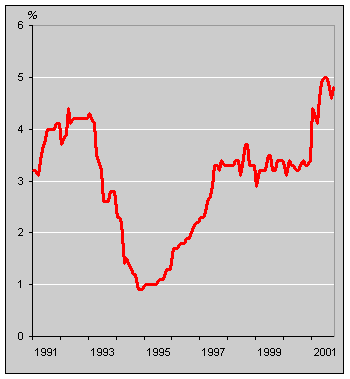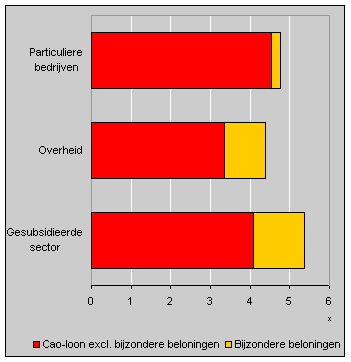Sharp rise in collectively agreeds wages

CCollectively agreed wages have risen sharply in the course of this year. By the summer they had already increased by five percent, the largest growth since 1982. After the summer the figures fell slightly. On average, collectively agreed wages have increased by 4.6% up to now in 2001.
Wage increases within collective labour agreements per year

More special allowances
In October 2001 the average collectively agreed wage per hour (including special allowances) was 4.8% higher than in October 2000. The increase in special allowances accounted for 0.5 of a percent point of this increases: if these special allowances are left out of account, the wage increase would be 4.3%. In various collective labour agreements, especially in the subsidised and government, agreements have been reached on an increase in end-of year bonuses.
Changes in collectively agreed wages per sector, October 2001

Subsidised sector leads the field
The largest increases in wages agreed within the framework of a collective labour agreement were reported in the subsidised sector. The hourly wage including allowances was 5.4% higher in October than twelve months previously. Special allowances accounted for a large part of this increase. A substantial rise was also observed in the business services sector. The underlying reason for this increase was the change in the salary system of agency employees. This increase had follow-on effects in the overall results for all the collective labour agreements. If the temp agency labour agreements are left out of account, the total increases in collectively agreed wages would be 4.4% instead of the present 4.8%. The wage increase was smallest for the government sector: 4.4%.
Wage increases adjusted for inflation

Collectively agreed wages and inflation
The increases in wages set in collective labour agreements were so strong this year that they exceeded those of 1992. The real wage increase, however, which takes account of inflation, is smaller. Moreover, compared with 1998-1999 the real wage change has fallen again.
Han van den Berg